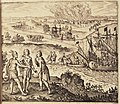Pocahontas
Pocahontas (born Matoaka, and later known as Rebecca Rolfe, c. 1596 – 1617) was a Native American woman notable for her association with the colonial settlement at Jamestown, Virginia. She was the daughter of Powhatan, the paramount chief of a network of tributary tribes in the Tsenacommacah, encompassing the Tidewater region of Virginia.
Early life[edit]
Pocahontas was born about 1596 and named "Amonute," though she also had a more private name of Matoaka. She was called "Pocahontas" as a nickname, which meant "playful one," because of her frolicsome and curious nature.
Interaction with the Jamestown colony[edit]
Pocahontas is most famously linked to the Englishman John Smith, who arrived in Virginia with a hundred other settlers in April 1607, where they built a fort on a marshy peninsula on the James River. The settlers were hoping to establish a permanent English settlement in the New World, but they had landed in the middle of a powerful Indian confederacy led by Powhatan.
Marriage and life in England[edit]
In 1614, Pocahontas converted to Christianity and was baptized "Rebecca." In April 1614, she and John Rolfe, one of the Jamestown colony’s leaders, were married. The marriage led to the "Peace of Pocahontas," a lull in the inevitable conflicts between the English and Powhatan Indians. The couple had one child, Thomas Rolfe, born in January 1615.
Death and legacy[edit]
Pocahontas's death was sudden. She was preparing to return to Virginia from England with her husband and son in March 1617, but she became ill and died. She was buried in Gravesend, England.
Pocahontas's legacy is a mix of fact and fiction, and she has been romanticized over the centuries in various books, documentaries, and films. Her story continues to be a source of inspiration, and her life—real and mythologized—resonates with themes of cross-cultural contact, female heroism, and the enduring power of myth.
This Virginia history-related article is a stub. You can help WikiMD by expanding it.
This article is a United States biographical stub. You can help WikiMD by expanding it!
-
Pocahontas
-
Pocahontas
-
Pocahontas
-
Pocahontas
-
Pocahontas
-
Pocahontas
-
Pocahontas
-
Pocahontas
-
Pocahontas
-
Pocahontas
-
Pocahontas
-
Pocahontas
Ad. Transform your life with W8MD's Budget GLP-1 injections from $75


W8MD offers a medical weight loss program to lose weight in Philadelphia. Our physician-supervised medical weight loss provides:
- Weight loss injections in NYC (generic and brand names):
- Zepbound / Mounjaro, Wegovy / Ozempic, Saxenda
- Most insurances accepted or discounted self-pay rates. We will obtain insurance prior authorizations if needed.
- Generic GLP1 weight loss injections from $75 for the starting dose.
- Also offer prescription weight loss medications including Phentermine, Qsymia, Diethylpropion, Contrave etc.
NYC weight loss doctor appointmentsNYC weight loss doctor appointments
Start your NYC weight loss journey today at our NYC medical weight loss and Philadelphia medical weight loss clinics.
- Call 718-946-5500 to lose weight in NYC or for medical weight loss in Philadelphia 215-676-2334.
- Tags:NYC medical weight loss, Philadelphia lose weight Zepbound NYC, Budget GLP1 weight loss injections, Wegovy Philadelphia, Wegovy NYC, Philadelphia medical weight loss, Brookly weight loss and Wegovy NYC
|
WikiMD's Wellness Encyclopedia |
| Let Food Be Thy Medicine Medicine Thy Food - Hippocrates |
Medical Disclaimer: WikiMD is not a substitute for professional medical advice. The information on WikiMD is provided as an information resource only, may be incorrect, outdated or misleading, and is not to be used or relied on for any diagnostic or treatment purposes. Please consult your health care provider before making any healthcare decisions or for guidance about a specific medical condition. WikiMD expressly disclaims responsibility, and shall have no liability, for any damages, loss, injury, or liability whatsoever suffered as a result of your reliance on the information contained in this site. By visiting this site you agree to the foregoing terms and conditions, which may from time to time be changed or supplemented by WikiMD. If you do not agree to the foregoing terms and conditions, you should not enter or use this site. See full disclaimer.
Credits:Most images are courtesy of Wikimedia commons, and templates, categories Wikipedia, licensed under CC BY SA or similar.
Translate this page: - East Asian
中文,
日本,
한국어,
South Asian
हिन्दी,
தமிழ்,
తెలుగు,
Urdu,
ಕನ್ನಡ,
Southeast Asian
Indonesian,
Vietnamese,
Thai,
မြန်မာဘာသာ,
বাংলা
European
español,
Deutsch,
français,
Greek,
português do Brasil,
polski,
română,
русский,
Nederlands,
norsk,
svenska,
suomi,
Italian
Middle Eastern & African
عربى,
Turkish,
Persian,
Hebrew,
Afrikaans,
isiZulu,
Kiswahili,
Other
Bulgarian,
Hungarian,
Czech,
Swedish,
മലയാളം,
मराठी,
ਪੰਜਾਬੀ,
ગુજરાતી,
Portuguese,
Ukrainian


